Customer self service tools enable customers to find answers and resolve their issues without human intervention. improving overall customer satisfaction. Based on the features we explained top 5 customer self service tools:
| Tool | Best for | |
|---|---|---|
1. | Ticket management, productivity | |
2. | IT self service | |
3. | Conversational self service | |
4. | Self service across Salesforce CRM environments | |
5. | Basic customer self service | |
What is customer self service?
Customer self-service refers to the process where customers can independently find solutions to their problems, access information, or complete tasks without the need for direct assistance from a customer service representative.
Use cases of inbound self service solutions:
- Wealth management
- Payment and billing
- Scheduling and reservations
- E-commerce
- SaaS Support
Freshdesk
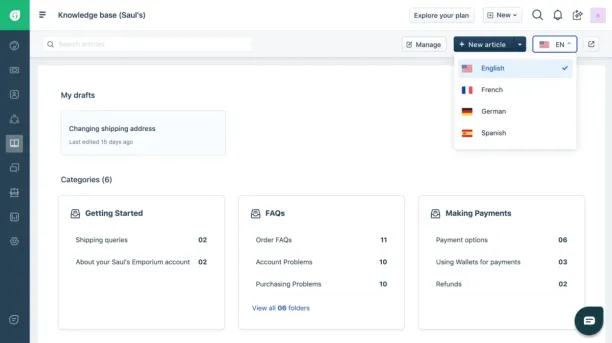
Why we like it:
- Integrations: Access to 1,200+ integrations.
- Knowledgebase bots: Freddy AI suggests relevant help articles to customers based on their queries in 40+ languages.
- Chatbot: The AI chatbot can efficiently handle common queries, reducing agent workload.
What needs improvement:
- Custom features: Freshdesk lacks some of the customization and automation found in platforms like Zendesk or Salesforce.
Self-service features: Few self-service features in the Growth plan.
Zendesk Support Suite
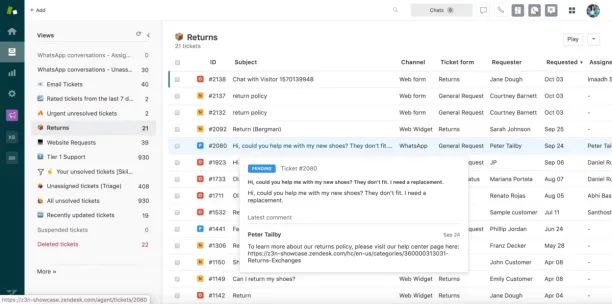
Why we like it:
- Help center: Zendesk allows users to create a customizable, structured knowledge base
- Ticketing system: Ticket routing capabilities enable users to manage customer queries across multiple support channels.
- No-code apps and integrations: Zendesk allows easy app setup and integrations without technical expertise.
What needs improvement:
- Complex setup: Setting up Zendesk is complex due to its vast array of features and customization options.
- Not for smaller teams: For smaller businesses, the platform’s extensive features may be underutilized, making it better suited for larger enterprises.
- AI-based features are a paid add-on
Intercom
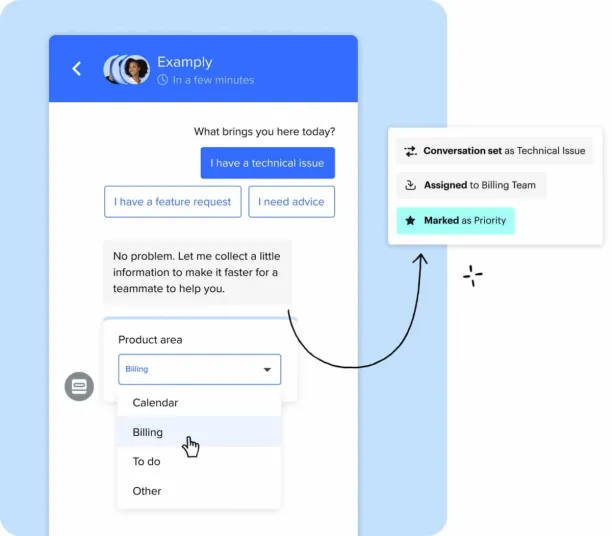
Why we like it:
- Workflow builder: Intercom’s workflow builder enables users to automate repetitive tasks, streamline customer interactions, with no coding required.
- Customizable help centers: It offers flexible tools to create and manage help centers and knowledge bases.
- Scalable solution: The platform can support complex operations.
What needs improvement:
- Pricing: Users are asked to pay extra for add-ons, no matter the plan.
- Learning curve: While feature-rich, onboarding can take time.
- Analytics: The analytics and reporting tools could benefit from more in-depth insights for data-driven decision-making.
Salesforce Service Cloud
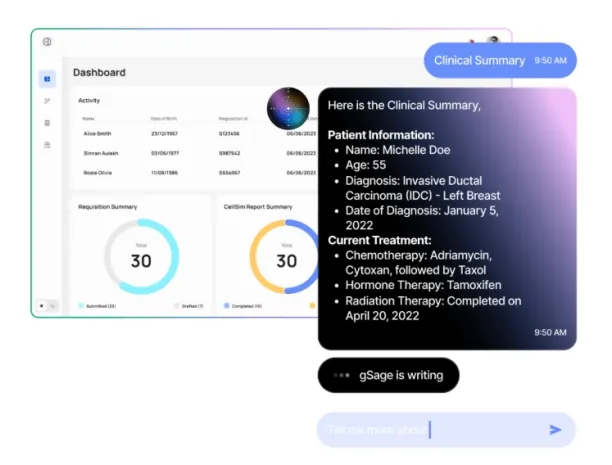
Why we like it:
- Deep Integration with CRM: Salesforce Service Cloud is tightly integrated with Salesforce CRM, providing a unified customer data view.
- Seamless workflow automation: The platform streamlines workflows by handling customer requests at scale.
- Mobile app capabilities: Provides a mobile app for managing customer interactions.
- Comprehensive data management: It offers highly customizable reports and admin features for managing and analyzing customer data.
What needs improvement:
- Help center: The help center feature is only accessible in the Enterprise plan and higher.
- Complex setup: The initial configuration of Salesforce Service Cloud can be difficult when integrating with non-Salesforce products.
- Add-ons: Community forums are an add-on.
Help Scout
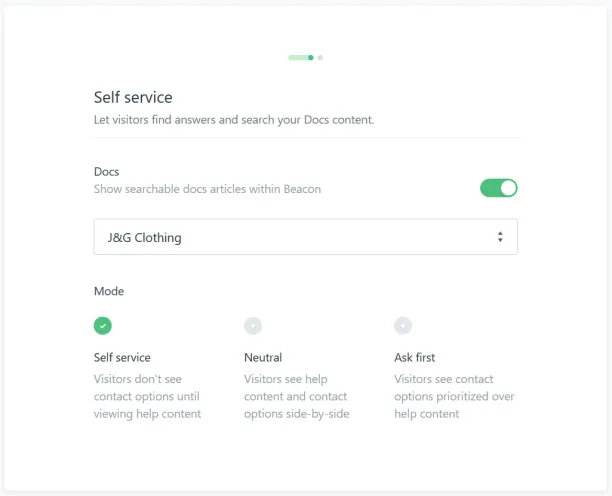
Why we like it:
- Simplicity: Best for smaller teams or businesses without dedicated technical resources.
- AI help widget: Beacon, an embeddable help widget, provides self-service options and direct communication with your support team.
- No-Code Editor: The no-code editor allows businesses to build and maintain their knowledge base content without needing technical expertise.
What needs improvement:
- Customization options: Customizable workflows are only available in the most expensive plan.
- Integrations: Integrations are not available in the free plan
Customer self service examples
- E-commerce retailer: A clothing store’s self-service portal lets customers track orders, view shipping status, and initiate returns. It also includes a chatbot for questions about sizing, care instructions, and policies.
- Telecom provider: A telecom company offers an interactive troubleshooting guide and video tutorials to help customers resolve common internet or phone issues without calling support.
- Banking app: A banking app enables customers to check balances, transfer funds, and pay bills. The built-in chatbot assists with tasks like setting up automatic payments.
- Software company: A software company provides a knowledge base and a community forum for users to find solutions and share tips, reducing the need for support interactions.
Types of customer self service
1- Customer self service portals
A customer self service portal is a specialized website or a part of an existing website that provides customers with personalized information and resources. It acts as a digital hub where customers can manage their interaction with the company at their own pace and convenience.
A self-service portal can enable many actions for customers, such as:
- Account management
- Order tracking
- Support ticket submission and tracking
- Personalized content and recommendations
Figure 1. A customer self service system on mobile apps and computer

Source: Salesforce
2- FAQs and knowledge bases
These are detailed sections on a company’s website where users can find answers to frequently asked questions or explore tutorials and guides that help them understand a product or service.
Moreover, an optimized FAQ or knowledge base can also improve a website’s SEO (Search Engine Optimization), as they can provide answers to questions people are typing into search engines, driving more organic traffic to the website.
3- Chatbots
A chatbot is an AI-powered tool designed to interact with humans in their natural languages. These interactions can occur via messaging applications, websites, or mobile apps. Chatbots are typically used in customer service environments to automate and streamline certain tasks.
In a customer self-service context, chatbots can handle a variety of tasks. For instance, they can:
- Answer frequently asked questions
- Help users navigate a website
- Provide product recommendations
- Assist with the checkout process
- Help troubleshoot basic problems.
4- Intelligent virtual assistants
An intelligent virtual assistant (IVA) can handle most customer interactions autonomously. Two principal machine learning elements, namely natural language understanding (NLU) and artificial emotional intelligence (AeI), underpin these virtual assistants.
IVAs are adept at accurately decoding user requests, even when faced with challenges like sarcasm, typographical errors, or inappropriate language.
Figure 2. Virtual assistants can understand user queries even if there are multiple spelling errors.
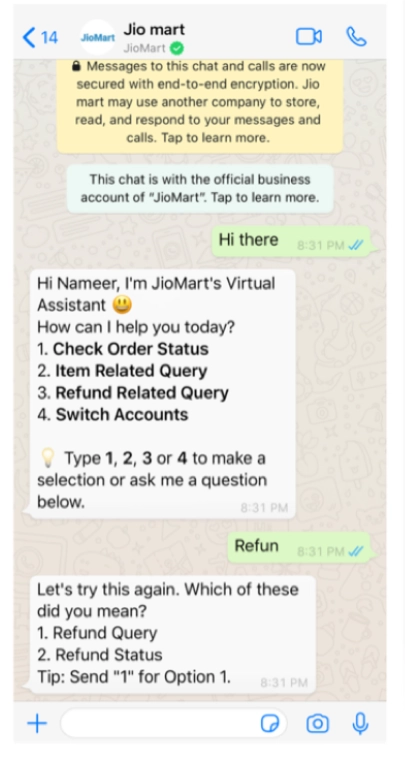
5- Interactive voice response (IVR) systems
These are telephony menu systems that use either speech-recognition or touch-tone keypad selection to navigate, manage, and route calls without a live operator. With IVR, customers can access information, perform tasks, or even make transactions outside of normal business hours. Also, IVR can provide pre-recorded information such as product details, service updates, FAQs, or account balances.
6- Custom automation workflows
Automation rules help handle questions that self-service or chatbots can’t resolve. These rules can include templated responses that automatically pull in customer and order details.
For example, a triage rule prioritizes tickets, assigns them to the correct team, and notifies customers of the next steps.
6- Forums and community platforms
These are online discussion sites where customers can interact with each other, share their experiences, and provide solutions to common problems.



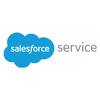


Comments
Your email address will not be published. All fields are required.